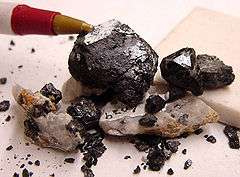Hercynite
| Hercynite | |
|---|---|
 | |
| General | |
| Category |
Oxide minerals Spinel group Spinel structural group |
| Formula (repeating unit) | Fe2+Al2O4 |
| Strunz classification | 4.BB.05 |
| Crystal system | Isometric |
| Crystal class |
Hexoctahedral (m3m) H-M symbol: (4/m 3 2/m) |
| Space group | Fd3m |
| Identification | |
| Formula mass | 173.81 g/mol |
| Color | Black |
| Crystal habit | Euhedral crystals. Also massive to granular |
| Cleavage | [111] indistinct |
| Fracture | Uneven - flat surfaces (not cleavage) fractured in an uneven pattern. |
| Mohs scale hardness | 7.5 |
| Luster | Vitreous (glassy) |
| Streak | dark green |
| Specific gravity | 3.95 |
| Optical properties | Isotropic |
| Refractive index | n=1.8 |
| Other characteristics | non-radioactive |
| References | [1][2][3] |
Hercynite is a spinel mineral with the formula FeAl2O4.
It occurs in high-grade metamorphosed iron rich argillaceous sediments as well as in mafic and ultramafic igneous rocks. Due to its hardness it also is found in placers.[1]
It was first described in 1847 and its name originates from the Latin name for the Harz, Silva Hercynia, where the species was first found.[1][2]
Hercynite is a spinel of regular symmetry and normal cation distribution, but some disorder occurs in its structure. It consists of ferrous (Fe2+) ions and aluminium ions, however some Fe3+ may be located in the structure of hercynite.[4]
References
- 1 2 3 Handbook of Mineralogy
- 1 2 Webmineral
- ↑ Mindat
- ↑ Jastrzębska, Ilona; Szczerba J.; Stoch P.; Błachowski A.; Ruebenbauer K.; Prorok R.; Snieżek E. (2015). "Crystal structure and Mössbauer study of FeAl2O4". Department of Ceramics and Refractories. Nukleonika-Journal of Nuclear Research. Institute of Nuclear Chemistry and Technology (60(1)): 47–49. doi:10.1515/nuka-2015-0012.
This article is issued from Wikipedia - version of the 11/27/2016. The text is available under the Creative Commons Attribution/Share Alike but additional terms may apply for the media files.
